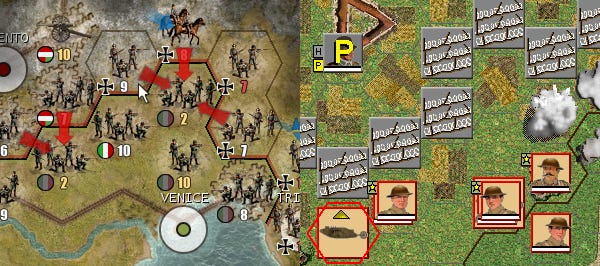The Flare Path: A Hextasy Of Fumbling
Simulation & wargame news
Where do you stand on the issue of simulated poison gas? If your answer is “Upwind!” then read on, I've a couple of new games here that may tickle your fancy. Commander: The Great War and Squad Battles: First World War come at The War To End All Wars from opposite directions. The former bestrides Europe and offers two-week turns and army-sized units. The latter bestrides No Man's Land (sometimes not even that) and occasionally lets a single plucky infantry squad turn the tide of battle. Both are mechanically conservative, but - based on the evidence of my preliminary playtests - rammed with the kinds of period challenges and pleasures that military-minded gamers will struggle to find elsewhere.
I'm about halfway through my first 118-turn Commander: The Great War campaign at present, and can't recall enjoying a grand-strategic WWI title more. Lordz seem to have judged the scale, pace and workload just about perfectly. Where other games tend to overestimate my energy levels and patience, wearying me with confusing rules, mountains of counters, and hives of hexes, CTGW takes me for the feckless Foch that I am.
My alarmingly western Western Front currently runs in a roughly diagonal welt from Calais to Switzerland. It consists of no more than twenty units. I can usually adjust, repair or upgrade it, in a couple of minutes, which is important as I've also got pressing business in the Alps, the Balkans, the Caucasus, The Holy Land, and Russia to attend to each turn.
As well as proceeding pleasingly swiftly, my attempt at keeping the Central Powers bottled up in central Europe has also managed to feel surprisingly plausible thus far. Putting aside some relatively minor concerns about sub warfare and marine transportation (should it really take six weeks to move an infantry unit from Southampton to Cherbourg?) and the odd eyebrow-raising occasion when the AI has allowed one of its fighter squadrons to be overrun, there have been few incidents when play has felt anything other than documentary. Gebirgskrieg in Northern Italy, the Turks lunging for the Suez Canal, Serbia battling to resist Austria's revenge... there are historical echoes everywhere.
And the AI looks to be as capable as it is believable. A few turns ago it punched a scarily big hole in my line near Paris with the help of some canny artillery use, and caused a pell-mell Russian retreat in the East with some deft cavalry employment. Whether it's also versatile and varied only time will tell. With no what-if scenarios, option to play as individual nations, or opportunities for diplomatic meddling, replayability could be seriously impaired if the Germans always employ the same version of the Schlieffen Plan, or, say, the Allies always land in the Dardanelles.
Of course, the one way to guarantee a quirky opponent is to brave multiplayer. The combination of Slitherine's tried-and-tested turn exchange system, and CTGW's sensible unit counts and sleek rule set, actually make the prospect of a month or two of PBEM World War seem rather attractive.
Higher unit counts and intricate combat mechanics, mean a turn of Squad Battles: First World War often requires more mouse clicks than a turn of CTGW. Don't let that put you off though. If you're more interested in KOing an A7V than researching one, if you prefer ordering men across barbed wire entanglements than national borders, then SBFWW is definitely worth a look.
The three or four small scenarios I've sampled have reminded me how moody and personal SB scraps can be. Barking MGs, wailing shells, and whining shrapnel (weapon audio is for-the-most-part excellent) admirably fill the atmosphere void left by the homespun 2D visuals (It's probably best not to mention the ghastly 3D view).
When, in between the usual business of moving and firing, you find yourself telling a nervous squad to hurl a smoke grenade, scavenge a dropped weapon, or don gasmasks, the game feels as close to Silent Storm or Men of War as Combat Mission or Close Combat.
As with Falklands, the last SB title I spent any time with, the scenario supply is generous, the level of scholarship behind it impressive. There must be years of play in the standalone battles and 7 linked campaigns, however, for the sake of time-poor wargamers everywhere I do wish that there were a few more pocket-handkerchief affairs like the Gallipoli engagement pictured below. When even a 'small' skirmish can eat up two or three (admittedly, absorbing) hours I think there's possibly a need for a new clash category: 'tiny'.










